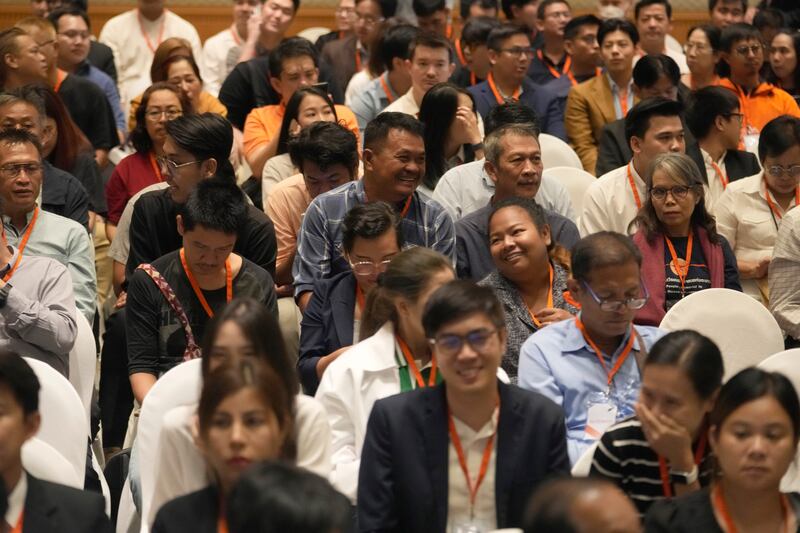Thailand's main opposition group's members gathered together under a new party they launched Friday to replace their earlier Move Forward Party that a court had dissolved two days before.
All the MFP’s lawmakers joined the new People’s Party, which replaced the former as the one with the most elected seats in parliament.
The 143 ex-MFP lawmakers also emerged with a resolve to become the only governing party in the next general election, which should be held in three years.
Parit Wacharasindhu, a former MFP spokesman now with the People's Party, explained what made members pick the new name.
“The reason we chose the name People’s Party is simple. We want to be a political party by the people, for the people, advancing towards a Thailand where supreme power belongs to the people,” he said.
The Constitutional Court on Wednesday disbanded MFP for a constitutional violation arising out of a campaign promise to amend a harsh law against defaming royals. At the same time it also banned 11 of MFP's top leaders from political participation for 10 years.
Those banned included MFP leader Pita Limjaroenrat, whose candidacy for prime minister was blocked by the-then military-aligned senators.
People’s Party is the third version of the original anti-establishment Future Forward Party, which was set up in 2018 and became wildly popular in a short time. But in 2020, the Constitutional Court dissolved Future Forward, ruling it had violated campaign finance regulations.
Future Forward’s members and MPs then launched the Move Forward Party that became even more popular than its earlier version. MFP, now rechristened as the People's Party, more than doubled its voter base, to 14 million in 2023 from 2020.

With much of MFP’s top leadership under a decade-long ban from politics, the People’s Party elected its leaders on Friday.
Computer engineer and heir to a real estate development company Nattapong Ruangpanyawut, 37, was elected party leader.
“Our mission at the People’s Party is to establish a government of change in the 2027 elections,” Nattapong told reporters at a news conference
“We must win the election, with the minimum goal of becoming the sole governing party. That is our ultimate aim.”
He pledged to maintain predecessor MFP’s stance on reforming the harsh law against defaming the monarchy – Article 112 of the Criminal Code, or lèse-majesté – which carries a penalty of up to 15 years behind bars.
“We have never communicated that we would lower our ambitions regarding any issue,” Nattaphong said.
“We remain firmly committed to proposing amendments to Article 112 to prevent its misuse as a political tool against opposition parties.”
Moving from what was the MFP to the People’s Party won’t end members’ problems, though.
The National Anti-Corruption Commission is investigating 44 ex-MFP lawmakers – now People's Party MPs – who had earlier proposed amendments to the royal defamation law. If found guilty, these MPs could face political bans, and that would reduce the party’s strength in parliament.
Thanaporn Sriyakul, Political Science Association chairman at Kasetsart University, said there was an urgent need to build confidence among the party’s supporters.
“The party must work to rebuild confidence as quickly as possible,” Thanaporn told BenarNews.
“Another necessary task is to function as an effective opposition. … If they can bring down one or two ministers, popularity and confidence should fully return.”
Looking ahead, it is the support base of the People’s Party that will keep it relevant, said Titipol Phakdeewanich, who teaches political science at Ubon Ratchathani University.
People's Party (or MFP) members don’t come from old political groups or political dynasties, Titipol told Benar News.
So if the 44 MPs are disqualified, it may affect the number in parliament in the short term but not in the long run, he said.
“I believe it won’t affect future elections,” Titipol said.
“Therefore, they are ready to create a new generation.”

Srettha’s fate
Meanwhile, Prime Minister Srettha Thavisin faces a Constitutional Court ruling next week in a case filed by conservative senators seeking to remove him from office.
The case stems from Srettha's appointment to the cabinet of Pichit Chuenban, who was detained for six months in 2008 for contempt of court – the case says it is a constitutional violation to appoint someone with a criminal record to the cabinet.
“For me, on Aug. 14, I will come to work as usual,” Srettha told reporters on Thursday afternoon.
“I have already sent my closing statement to the court. I don’t want to say anything more now,” added the politicians from the Pheu Thai party, which lost its progressive credentials when it allied with some military-associated parties to form a coalition government
But earlier this week, Wisut Chainarun, a Pheu Thai MP and the government's chief whip, said he was “100 percent confident” Srettha would survive this challenge.
“We believe what Prime Minister Srettha did was correct and no one in the party has ever talked about this issue,” he told reporters.
“Everyone has confidence in the prime minister and encourages him to work to his full capacity. We are 100% confident that the prime minister will certainly be safe.”
Ruj Chuenban in Bangkok contributed to this report.
